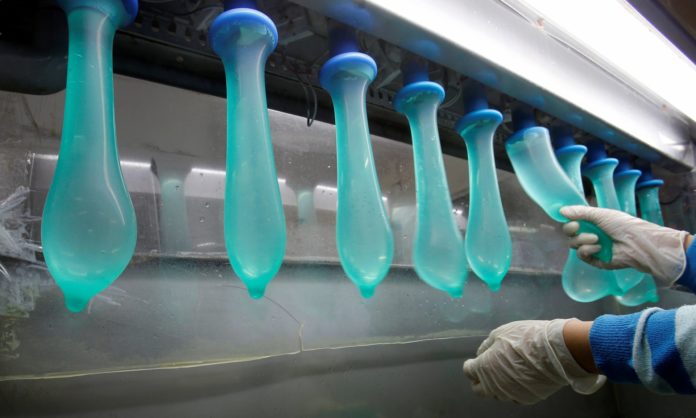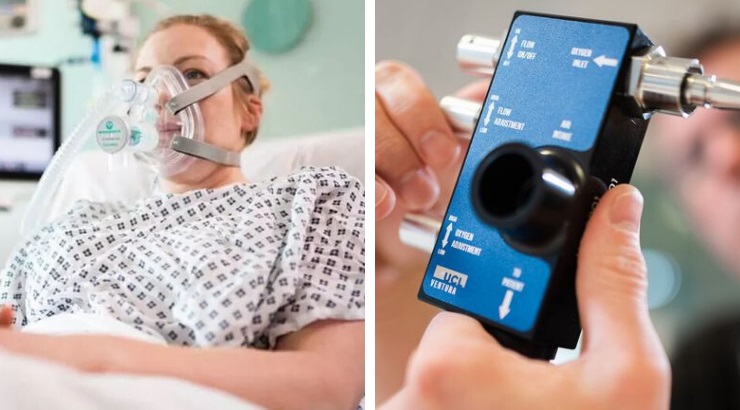
Title image: A worker performs a test on condoms
We’ve all seen the jokes on social media about how nine months from now a new generation will be born that will eventually be dubbed “Coronials”—and once they come of age, “quaranteens.”
After all, if we’re stuck working from home or self-isolating along with our partner or significant other, it’s only natural and healthy for us to seek solace through sexual activity—and the increase in baby-making activities can naturally result in a miniature “baby boom.”
But as it turns out, the joke may have some basis after all—especially because a global shortage of condoms could deprive couples staying at home from one of the more popular birth control methods.
Reuters reports that Malaysia’s Karex Bhd, a company that is responsible for producing one out of every five condoms globally, spent over a week without producing a single condom at its three factories after the government imposed a lockdown to halt the spread of the coronavirus.
This has resulted in a shortfall of 100 million condoms which normally would be marketed worldwide under such brands as Durex, distributed through aid programs like the United Nations Population Fund, and the U.K.’s National Health Service (NHS).
On Friday, the company was granted permission to resume production under a special exemption for critical industries but with only half of its workforce.
Chief Executive Goh Miah Kiat said:
“It will take time to jumpstart factories and we will struggle to keep up with demand at half capacity.
We are going to see a global shortage of condoms everywhere, which is going to be scary.
My concern is that for a lot of humanitarian programs deep down in Africa, the shortage will not just be two weeks or a month. That shortage can run into months.”
The news comes as condoms rank among toilet paper and hand sanitizer as one of the most sought-after items during the CoViD-19 crisis, reports Highsnobiety.
Earlier this month, sex product retailer Promescent’s CEO Jeff Abraham confirmed that the company saw surging condom sales all month.
Speaking to Business Wire, the executive said:
“In fact, we’ve seen a 54 percent increase in our online sales since the beginning of the pandemic.
With the tremendous effort put forth by so many government and local organizations, we want to do our part to ensure people are continuing to practice safe sex and have adequate access to birth control in a time of social distancing and self-isolation.”
In times of uncertainty and isolation, it’s natural to seek physical and emotional intimacy https://t.co/ybAyWkzgF6
— Jeff Abraham (@JeffAbraham111) March 19, 2020
Condom factories in China, India, and Thailand have also faced disruptions in their operations. Similar problems have also been faced by regional manufacturers of critical protective gear like medical gloves in Malaysia.
A Durex spokesman reassured Reuters that operations would continue as normal, and no supply shortages are anticipated. They added:
“For our consumers, many of whom will be unable to access shops, our Durex online stores remain open for business.”
Goh added that while condom production may face interruptions, the demand for the contraceptive remains stronger than ever. He said:
“The good thing is that the demand for condoms is still very strong because like it or not, it’s still an essential to have.
Given that at this point in time people are probably not planning to have children. It’s not the time, with so much uncertainty.”
Mercedes F1 Race Team Fast-Tracks Creation of Revolutionary New Coronavirus Breathing Aid
A collaboration between Mercedes Formula One and a group of clinicians and engineers has led to the creation of a new type of breathing aid for CoViD-19 patients.
The Continuous Positive Airway Pressure (CPAP) breathing aid delivers oxygen to patients’ lungs without the need for a ventilator and has commonly been used to treat sleep apnea. Now, an improvement on the device, is allowing those suffering from CoViD-19 to breathe easier without needing to be intubated.
The device, which was created within 100 hours of the first conceptual meeting, has been widely used with success on patients in China and Italy and has already been approved for use by the U.K.’s National Health Service (NHS), reports BBC.
Engineers at University College London (UCL) and clinicians at UCL’s NHS Foundation Trust worked around the clock with experts from the U.K.-based Mercedes-AMG High Performance Powertrains to reverse engineer the device based on the CPAP system.
Forty of the devices are already being rolled out to University College Hospital (UCLH) and three other hospitals in London. If the trials are successful, the German automotive giant will be able to mass-produce the CPAP machines at a rate of 1,000 per day.
A breathing aid that can help keep coronavirus patients out of intensive care has been created in under a week. UCL engineers worked with clinicians at UCLH and Mercedes Formula One to build the device, which delivers oxygen to the lungs without needing a ventilator. (CPAP) pic.twitter.com/GcC8oNAHRf
— KKANDOO ENGLISH (@KKANDOOENGLISH) March 30, 2020
UCLH critical care consultant Professor Mervyn Singer said:
“These devices will help to save lives by ensuring that ventilators, a limited resource, are used only for the most severely ill.
While they will be tested at UCLH first, we hope they will make a real difference to hospitals across the UK by reducing demand on intensive care staff and beds, as well as helping patients recover without the need for more invasive ventilation.”
Andy Cowell, managing director of Mercedes-AMG High Performance Powertrains, said:
“The Formula One community has shown an impressive response to the call for support … we have been proud to put our resources at the service of UCL to deliver the CPAP project to the highest standards and in the fastest possible timeframe.”
In the meantime, VentilatorChallengeUK—a consortium of engineering firms including Airbus, Ford, Rolls-Royce, BAE Systems, Siemens, and a range of Formula One racing teams—has secured orders of over 10,000 ventilators to be provided to the U.K.’s healthcare system. Production will kick off in a week.
So proud of our #ukmfg engineering #VentilatorChallengeUK consortium. Using the best of #MadeSmarter advanced digital technology to help pull this off. You are all amazing @HVM_Catapult@SiemensUKNews @Airbus, Smiths, Penlon, GKN and other partners!https://t.co/aGwtjl7sny
— Juergen Maier (@Juergen_Maier) March 29, 2020
Dick Elsy, chief executive of High Value Manufacturing Catapult, said:
“This consortium brings together some of the most innovative companies in the world.
They are working together with incredible determination and energy to scale up production of much-needed ventilators and combat a virus that is affecting people in many countries.”
This comes as the U.K. government continues to struggle with the pandemic and top officials warn that emergency measures could remain in place for as long as six months.
There are currently 9,000 people hospitalized with CoViD-19 in the U.K., a sharp rise from 6,000 on Friday. As of Sunday, the total number of people who have died from the virus in the U.K. reached at least 1,408.





